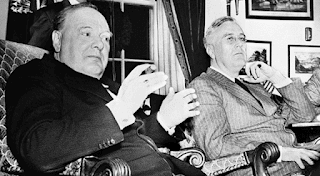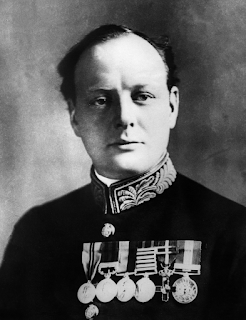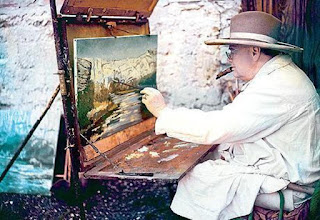Holiday History: Christmas 1941
Many readers may not have known that Winston Churchill came to visit Franklin Roosevelt just two weeks after Japan bombed Pearl Harbor. On the day when Roosevelt delivered his famous "day of infamy" speech, December 8th, 1941, Churchill offered to make a special trip to the White House. “We could review the whole war plan in light of reality and new facts,” he eagerly wrote. FDR was concerned about the German U-boats, but after Churchill convinced him that he would somehow stay perfectly safe, and the President replied that he would be “delighted to have you here at the White House."
 Two weeks later, Churchill arrived in Washington for a three-week stay at the White House. He celebrated Christmas 1941 with FDR and Eleanor Roosevelt, who despite being an extremely accommodating hostess, was slightly annoyed at the English Prime Minister. Roosevelt had forgotten to tell his wife that Churchill would be staying so long, and she had been under the impression that he would be only stopping by for a day or two. This was not the end of her troubles. Churchill required an English breakfast which the White House chefs struggled to replicate, and he talked to the President until the small hours of the morning, something Eleanor disapproved of. Despite these difficulties, Winston Churchill was skilled conversationalist, and since his wide span of interests equipped him well for socializing at White House events and dinners, his hosts were thankful for his presence. During his stay, Churchill and FDR formed a strong alliance between the United States and Great Britain that helped save Europe from Hitler and the Axis powers. The visit was well worth the trouble one both parts, and the Roosevelts were sad when he left.
Two weeks later, Churchill arrived in Washington for a three-week stay at the White House. He celebrated Christmas 1941 with FDR and Eleanor Roosevelt, who despite being an extremely accommodating hostess, was slightly annoyed at the English Prime Minister. Roosevelt had forgotten to tell his wife that Churchill would be staying so long, and she had been under the impression that he would be only stopping by for a day or two. This was not the end of her troubles. Churchill required an English breakfast which the White House chefs struggled to replicate, and he talked to the President until the small hours of the morning, something Eleanor disapproved of. Despite these difficulties, Winston Churchill was skilled conversationalist, and since his wide span of interests equipped him well for socializing at White House events and dinners, his hosts were thankful for his presence. During his stay, Churchill and FDR formed a strong alliance between the United States and Great Britain that helped save Europe from Hitler and the Axis powers. The visit was well worth the trouble one both parts, and the Roosevelts were sad when he left.Enjoy this interesting video of Churchill and Roosevelt's Christmas Eve speeches at the White House:
For those who might prefer a more in-depth look at this Christmas celebration, The Big Sleepover at the White House provides a comprehensive view of Churchill's holiday journey. This five-star book is sure to please history buffs and Churchillians alike. Buy it on amazon.com here
"In the Darkest Days of World War II, Winston Churchill’s Visit to the White House Brought Hope to Washington" by Erik Trickney. www.smithstonianmag.com.
"Christmas at the White House with Winston Churchill" by Meredith (good name!) Hindley. www.neh.gov.






I did not know this very important fact about WWII history! Very interesting!
ReplyDelete